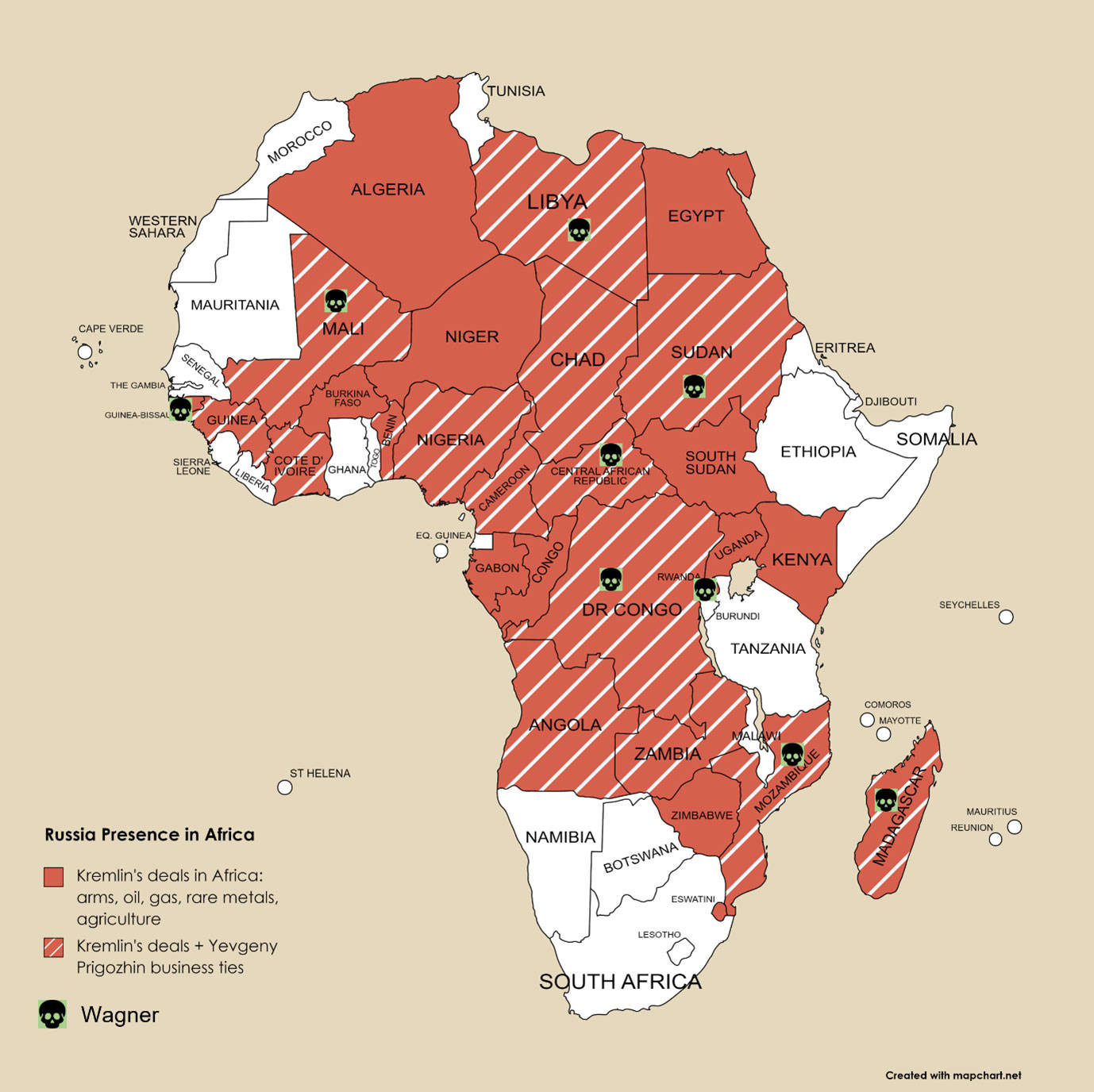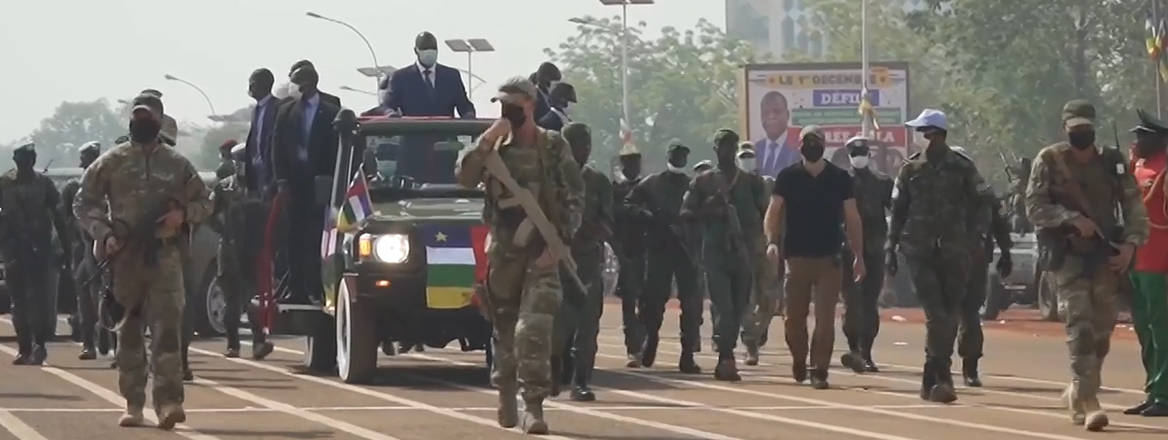Playing in the Shadows: Putin’s Doppelgänger Army
Recent moves by Russia to reinforce its invasion of Ukraine with Wagner Group mercenaries highlight the group’s growing role in pursuing Russia’s geopolitical objectives.
The German word doppelgänger literally translates as ‘walking double’ and alludes to paranormal ‘duplicates’ that can manifest in many ways: you can see them in your peripheral vision, meet them somewhere on a lonely road, or see them while looking in the mirror – you see them, but they do not exist. This description very much applies to the Wagner Group, the largely invisible, officially non-existent, unregistered, mighty and resourceful private army with obscure ties to the Kremlin.
Purportedly born in Ukraine, in the Donetsk and Luhansk regions, Wagner has been playing a key role in the country since the first outbreak of conflict in 2014. Wagner mercenaries have allegedly been spotted in Mariupol and other Ukrainian cities – an observation in line with UK intelligence, which indicates that over 1,000 mercenaries have been displaced from other operating areas in Africa and are about to enter in the conflict. However, if the modus operandi is the same as 2014, it is almost certain that Wagner forces were already positioned in key separatist enclaves in Ukraine awaiting the signal to move.
Operating within a blurry bubble where state and non-state actors merge into an intricate and nebulous network of power, Russia’s doppelgänger army has been deployed to carry out operations in areas where the Russian army cannot legally be involved. They are not subject to ‘body bag syndrome’ (a loathing of casualties that reduces public support for military missions) and they offer plausible deniability, allowing the Kremlin to exert power with invisible hands and providing leeway for Russian foreign policy messaging. The distinguishing factor between Wagner and other private military companies (PMCs) is that they have been actively involved in combat activities in Syria and Libya, acting as a proxy for Moscow.
Officially, Wagner does not exist, and it is not framed under Russian law as Russia has outlawed mercenaryism under Article 359 of its criminal code. As such, a mercenary without a legal framework cannot be deceased in combat. They vanish without a name, a body or a trace of existence. In short, Wagner is a phantom state-sanctioned force running without the official limitations and red lines of a conventional state agency.
Viewed by Putin as an ‘act of love’, the invasion of Crimea in 2014 triggered a series of events that shed light on the operational capacity and influence of Wagner in the geopolitical aspirations of Russia. The use of mercenaries in Crimea was always denied by the Kremlin and when confronted by the media, Russian officials replied that they were doing voluntary work in Ukraine, perhaps even on holiday. The presence of the ‘little green polite man’ – alluding to the fact that the military were wearing unidentified uniforms – nonetheless raised several questions regarding the presence of private armies within the country.
Profiting from the success in Crimea and capitalising on the effectiveness of their operations, Wagner saw a window of opportunity, and started matching the Kremlin’s foreign policy interests with their own profit-making activities. While there is no official record of Wagner operating in Syria in 2015 and 2016, several pictures and videos shared on social media prove they had a leading role in supporting the recapture of Palmyra on behalf of Syrian President Bashar al-Assad. This was also corroborated by a report written by Denis Korotkov, a Russian independent journalist, who unveiled more robustly the complex web linking the Kremlin and the paramilitary company.
A mercenary without a legal framework cannot be deceased in combat. They vanish without a name, a body or a trace of existence
Wagner has obscure connections to the Kremlin via the Main Directorate of the General Staff of the Armed Forces and the Foreign Intelligence Service. Western knowledge of Wagner’s character and capacity is still rather blurred, mainly due to Russia’s continuous disinformation campaigns and efforts to deny responsibility for Wagner’s operations. However, several documents indicate that they have been engaged in numerous conflicts and unstable zones, namely in Syria, Sudan, the Central African Republic (CAR), Libya, Mali, Venezuela, Mozambique and Ukraine (2014), and are playing a strategic role in the present conflict between Russia and Ukraine. But they have also been involved in particular security activities, such as enabling the exploitation of natural resources across Africa, and disinformation operations targeting elections in Europe and Africa.
Purportedly founded by Dmitry Valeryevich Utkin, the paramilitary group takes its name from Utkin’s war nickname, Wagner, in a tribute to Adolf Hitler's favourite composer and his affinity with visions – an irony considering that Putin allegedly invaded Ukraine to de-Nazify the country.
The connections between Wagner and the Kremlin were always shadowy. Although not recognising its existence, in December 2016, during the celebrations of the Day of Heroes of the Fatherland, the Kremlin promoted a celebratory event that decorated hundreds of military servicemen and civilians – among them Dmitry Utkin. He was awarded the Order of Courage, most probably for leading Wagner operations in Syria. Dmitry Peskov, the Kremlin’s spokesman, confirmed that Utkin was among the honourees, and underlined that he qualified because ‘Usually they give it for courage’.
Behind the financial backbone of Wagner is an intricate apparatus run by Yevgeny Prigozhin, a convicted criminal and successful businessman who has been growing his influence since Putin became president. Prigozhin, who has been nicknamed ‘Putin’s chef’ due to his profitable Kremlin catering contracts, was accused by the US of running a troll factory that purportedly directed Russian meddling in the 2016 US elections to the benefit of Donald Trump, and is linked directly and indirectly to several profitable contracts in Africa and Syria that have been sponsoring Wagner’s activities. For example, in Syria, Wagner’s operations were financed via a parallel contract between the General Petroleum Corporation – a state-owned Syrian company in charge of the exploitation of gas and oil – and Evro Polis, one of Prigozhin’s companies. The contract stated that Evro Polis would receive 25% of the revenue from hydrocarbon exploitation, in exchange for Wagner’s protection. The same has happened in the CAR, where Lobaye Invest, associated with Prigozhin, received permission to mine diamonds and gold in four cities. When war correspondent Orkhan Dzhemal, cameraman Kirill Radchenko and director Alexander Rastorguev, went to the CAR in June 2018 to investigate the activities of Prigozhin's companies, they were murdered. Culpability for their deaths is yet to be established.
Putin’s Geopolitical Master Play: Russian Imperialism in Africa
Between Syria and the present conflict in Ukraine, Wagner has increased its operations in Africa in line with Russia’s official foreign policy strategy to expand its presence on the continent. While Russia offers political protection, Wagner has ensured that it is properly distributed. It has done this by focusing on three objectives: 1) securing access to critical natural resources; 2) carving out a presence where Western influence is narrow; and 3) engaging in training activities. By taking advantage of the political fragility of some African states, bit by bit, Russia has been expanding its influence in Africa. But were these activities part of Putin’s expansionist goals towards Ukraine? Arguments can be found to support this.
After the collapse of the Soviet Union in 1991, Russia’s presence in Africa decreased. Following Putin’s rise to power, there was a renewed interest in Africa. Through a ‘back office’, Yevgeny Prigozhin led Putin’s military and political activity in Africa, not only pursuing commercial contracts, but also meddling in African politics, inciting anti-Western sentiments and reviving old territorial disputes. The map below is illustrative of how large Prigozhin’s and Russia’s influence in Africa is, and how it reflects the three aforementioned objectives:

According to the Stockholm International Peace Research Institute, Russia has signed several arms deals with African states – mainly countries overlooked by the West – becoming the largest supplier of arms in Africa, while also strengthening its military presence on the continent by aiming to build military bases in six countries. Meanwhile, a classified document entitled ‘Russia's New Africa Ambitions’ has revealed the Kremlin’s overarching objectives, with Africa as a top priority.
How does this relate to the current conflict in Ukraine? Russia’s invasion has made clear that Putin has a long-planned strategy for achieving his geopolitical goals. Moscow’s influence in Africa is intrinsically linked to the Kremlin’s strategy in Ukraine. Africa has not only provided a great training ground for Russian forces – especially in Mali and the CAR – but has also proven to be sympathetic to Russia. As Peter Knoope, former Director of the International Centre for Counter-Terrorism, said: ‘the West tends to focus on Ukraine and not zoom out to the bigger picture. That has been a weakness for a long time’.
This has also been clearly reflected in the first vote by the UN General Assembly on the Ukraine conflict, where Algeria, Angola, Cameroon, Morocco, Mali, Namibia, the CAR and South Africa did not condemn Russia's invasion – revealing the results of a longstanding campaign by Russia to use Pan-Africanism to nurture anti-Western sentiment and bolster its influence on the continent.
In December 2021, Mali was accused of allowing Wagner mercenaries into its territory. Though always repudiating the accusations, there is evidence that several Russian military airplanes have flown between Bamako and Russia over the past few months, confirming the presence of Russian paramilitary forces in the territory – a fact also confirmed by General Stephen Townsend, commander of US Africa Command. This was also reinforced by a French government announcement regarding the group’s predatory intentions towards Malian territory.
Human Rights Watch (HRW) recently reported a massacre in the Malian city of Moura. According to witnesses, there are mass graves containing between 200 and 100 corpses. The HRW report mentions that Malian and ‘white’ soldiers – presumably Wagner – have summarily executed several hundred people, and graphically describes mass abuses, which can certainly be framed as war crimes and crimes against humanity. A similarly horrendous scenario was recently witnessed in Bucha in Ukraine. Same perpetrators? Not literally, perhaps. However, it is undeniable that these events have the fingerprints of Russian forces.
Russia is not isolated – it has been consolidating its ties in places where Europe has been absent, and has established a network with a powerful global reach
At the end of March, at the same time as Jeremy Fleming, head of the UK’s GCHQ, confirmed that the Wagner Group was planning to send ‘large numbers of personnel’ to Ukraine to fight alongside Russian soldiers, Russia officially started a process to legalise PMCs in Russia, including their participation in peacekeeping operations through international organisations.
After years of claiming that PMCs were not legal in Russia, Putin has finally unveiled his grand strategy: a strong arm inside and outside Russia, legally framed and with immense power and resources. Russia is not isolated – it has been consolidating its ties in places where Europe has been absent, and has established a network with a powerful global reach. Moreover, the privatisation of Russian geopolitics is no longer a mirage – it is a very real threat. The question now is how the West will respond.
The views expressed in this Commentary are the author’s, and do not represent those of RUSI or any other institution.
Have an idea for a Commentary you’d like to write for us? Send a short pitch to commentaries@rusi.org and we’ll get back to you if it fits into our research interests. Full guidelines for contributors can be found here.
WRITTEN BY
Dr Joana de Deus Pereira
Senior Research Fellow
RUSI Europe
- Jim McLeanMedia Relations Manager+44 (0)7917 373 069JimMc@rusi.org


